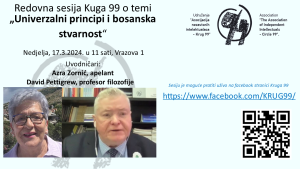HUMAN (LACK OF) RIGHTS AND MAINTENANCE OF THE DOMESTIC AND INTERNATIONAL ORDER

| 29 January 2024 – 52 Sarajevo, Bosnia and Herzegovina Krug 99 – “Circle 99” HUMAN (LACK OF) RIGHTS AND MAINTENANCE OF THE DOMESTIC AND INTERNATIONAL ORDER For Bosnia and Herzegovina, the implementation of the European Convention on Human Rights is of the utmost strategic importance in achieving long-term peace and stability. As a ‘constitutional instrument of European civil order,’ the Convention is the most significant part of the Peace Agreement for Bosnia. These are the only foundations that would enable the all-encompassing development, progress and construction of a Bosnian state that would be a democratic, lawful, economic, social and cultural community and a member of the Council of Europe, as well as, in the future, the European Union (EU). The prioritization of the Convention over the Bosnian Constitution and the importance of the Convention’s immediate implementation was confirmed by the European Commission for Democracy Through Law (commonly called the “Venice Commission”). It was on this basis in 2006 that the Parliamentary Assembly of the Council of Europe set forth the “roadmap for Bosnia and Herzegovina.” The intention was that through the Venice Commission a new Constitution for Bosnia could be drafted no later than 2010. This would emulate what the Commission had accomplished in many other states in transition following the fall of the Berlin Wall. This would have been a simpler, more efficient and cheaper way for the Council of Europe, the EU, the High Representative, the state and the citizens of Bosnia. But in Bosnia the relevant European institutions did not utilize all mechanisms available to achieve the efficient implementation of the Convention and the application of all decisions of the European Court of Human Rights, including the most important court decision, “Kovacevic vs Bosnia and Herzegovina.” That being the case, the political actors that favor maintaining the current improvised Constitution of Bosnia must bear responsibility for pandering to ethno-nationalism and for the continued decline of the state. One solution would be to grant candidate status [for EU membership] and through that to begin the implementation of decisions by the European Court and then, together with the Venice Commission, to harmonize provisions of the Bosnian Constitution with the European Convention on Human Rights. In that way, Bosnia could strengthen its own institutions fulfilling these commitments and could become – like every other member of the Council of Europe, the EU and NATO – a modern democratic state with the rule of law protecting human rights and successfully meeting challenges of the modern era. Current manipulations involving changes in the electoral process and the issuance of conflicting reports of election results are only the tip of the iceberg when it comes to disorderly conditions in the electoral process. All of this in turn impacts on voters and their lack of confidence in the electoral process. A number of active participants in election manipulation have never been called to account, which points up the need for preventive legislation on both the general and the individual levels in this field. In the final analysis, the carrying out of decisions by the European Court of Human Rights necessitates changes in the Constitution and in the Electoral Law of Bosnia and Herzegovina. That is the sine qua non condition of an electoral system that would be effective and would be based on respect for the active and passive rights of all citizens, which would be guaranteed to the maximum extent without regard to ethnic, religious, geographic or any other form of individual identity. Changes in the Bosnian Electoral Law, especially as regards the integrity of the electoral process, are the most topical and urgent requirement aimed at guaranteeing that the genuine will of the electorate, as registered at the polling stations, will be reported in the final election results. This would reaffirm voter confidence in elections. Any legal solution that establishes discrimination among individual citizens of Bosnia, on whatever basis, needs to be rejected. Clearly, states around the world have obliged themselves to implementation through the 1966 International Covenant on Civil and Political Rights. And it is clear that they have adapted this to their own national interests. But it is equally clear that there are rather weak practical mechanisms for protection, implementation, supervision and control, or, for that matter, mechanisms for sanctioning those states that do not fulfill their international obligations and in that way violate the human rights within their purview. Be that as it may, implementation for Bosnia is the path towards permanent peace, regardless of the fact that today’s international community very often rationalizes not fulfilling its own obligations by deferring to absolute sovereignty and by relying on the principle of non-interference in the internal affairs of other states. This is an entirely erroneous point of view. Human rights are not restricted to the domain of domestic affairs. Rather, today their protection is regulated at the international level, while the sovereignty of states is limited precisely by international law. What we are witnessing today in Bosnia and Herzegovina is all too often the systemic, organized and widespread violation of human rights and freedoms, which in fact represent the most heinous crimes of discrimination. This directly threatens the most important values of peace and the contemporary world order. The reasons for an unsatisfactory, inadequate and inefficient system of protecting human rights rest in the fact that we have only weak mechanisms for monitoring the implementation of decisions by international courts and other court agencies. In addition, there is the absence of concrete measures that can be taken against violating states. The time has come once again to reopen the old question of reforming the United Nations, primarily reorganizing the Security Council, so that it can more effectively fulfill its primary mission, the preserving of international peace and security. ** [This session of “Circle 99” was organized on the occasion of International Day of Human Rights. Presenters at this session were: Dr. Lada Sadikovic of the Department of Forensics, Criminology and Security Studies at the University of Sarajevo; Enis Omerovic of the Department of Law at the University of Zenica; and, Dr. Albin Muslic of the Department of Law at the University of Bihac.] ** Adil Kulenovic President, Krug 99 (Circle 99) www.krug99.ba adil.kulenovic@krug99.ba Vrazova 1, Sarajevo |
| Association of Independent Intellectuals – Circle 99 (Bosnian: Krug 99), a leading Bosnian think-tank, was established in Sarajevo in 1993, in the midst of the Bosnian war (1992-1995), while the capital was under siege. Circle 99 provides a platform to bring together intellectuals of various professional and ethnic identities; university professors, members of the Academy of Sciences and Arts of Bosnia and Herzegovina, artists, journalists, entrepreneurs, diplomats, and other prominent figures from Bosnia and from abroad. Multidisciplinary discussions and initiatives are held each Sunday throughout the academic year, in the form of regular sessions about politics, science, education, culture, economy, and other societal issues. The overall goal is to sensitize the public towards a democratic transformation, achieving and maintaining peace, and integration of modern Bosnia into the community of countries fostering liberal democracy. Circle 99 has been declared an organization of special significance for the city of Sarajevo. |







